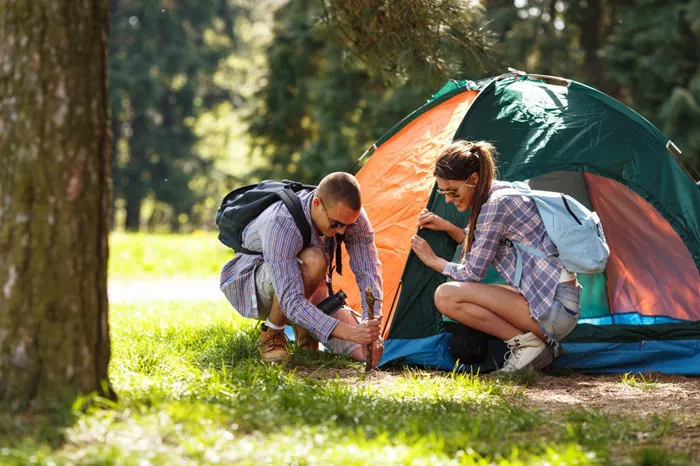Camping is a great way to connect with nature. But if you’re new to camping, packing the right gear is important. This guide will help beginners know what to bring for a safe and fun trip.
Essential Camping Gear
Before heading out, make sure you have the basics. These items will keep you comfortable and safe.
Tent
A good tent is your shelter. Choose one that fits your group size. Check if it’s waterproof. Practice setting it up at home first.
Sleeping Bag
Pick a sleeping bag rated for the weather. Cold nights need a warm bag. Lightweight bags are best for summer.
Sleeping Pad or Air Mattress
The ground is hard. A sleeping pad or air mattress adds comfort. It also keeps you warmer by insulating from the cold ground.
Camping Pillow
A small camping pillow helps you sleep better. You can also use a rolled-up jacket if you want to save space.
Clothing for Camping
Weather can change fast outdoors. Pack the right clothes to stay dry and warm.
Moisture-Wicking Base Layers
These keep sweat away from your skin. They dry fast and help regulate body temperature.
Insulating Layers (Fleece or Down Jacket)
For cold nights, a warm layer is a must. Fleece and down jackets are lightweight but warm.
Waterproof Jacket
Rain can happen anytime. A waterproof jacket keeps you dry. Look for breathable materials.
Quick-Dry Pants and Shorts
Avoid cotton—it stays wet. Quick-dry fabrics are better for hiking and outdoor activities.
Sturdy Hiking Boots or Shoes
Good footwear prevents blisters. Waterproof boots are best for wet conditions.
Extra Socks
Wet feet can lead to blisters. Pack extra pairs of wool or synthetic socks.
Cooking and Food Supplies
Cooking outdoors is fun but requires the right tools.
Portable Camping Stove
A small gas stove is easy to use. It lets you boil water and cook meals.
Fuel for Stove
Check what fuel your stove needs. Bring extra in case you run out.
Lighter or Waterproof Matches
You’ll need fire for cooking. Keep matches or a lighter in a dry place.
Cooking Pot and Pan
A lightweight pot and pan are useful. Non-stick ones are easier to clean.
Utensils (Spoon, Fork, Knife)
Bring reusable or biodegradable utensils. A pocket knife is also handy.
Plates and Bowls
Lightweight camping dishes save space. Collapsible ones are easy to pack.
Biodegradable Soap and Sponge
Clean your dishes after eating. Biodegradable soap is safe for nature.
Cooler with Ice Packs
If bringing perishable food, a cooler keeps it fresh. Use ice packs to avoid melting mess.
High-Energy Snacks
Trail mix, nuts, and energy bars are great for hikes. They keep you fueled.
Water Bottles or Hydration Bladder
Staying hydrated is key. Bring enough water or a way to purify natural water.
Safety and Navigation
Being prepared prevents accidents.
First Aid Kit
Bandages, antiseptic, pain relievers, and any personal medicines should be included.
Map and Compass (or GPS)
Phones can lose signal. A map and compass are reliable backups.
Flashlight or Headlamp
A headlamp keeps hands free. Bring extra batteries.
Whistle
In emergencies, a whistle helps rescuers find you.
Multi-Tool or Swiss Army Knife
Useful for cutting, opening cans, and small repairs.
Hygiene and Comfort
Staying clean makes camping more enjoyable.
Quick-Dry Towel
Regular towels stay wet too long. A quick-dry towel is better.
Toothbrush and Toothpaste
Keep up with dental hygiene even outdoors.
Toilet Paper and Trowel
If no toilets are available, bury waste properly. Pack out used toilet paper.
Hand Sanitizer
Clean hands before eating when water isn’t available.
Sunscreen and Bug Spray
Protect skin from sunburn and insect bites.
Trash Bags
Leave no trace. Pack all trash out with you.
Extras for a Better Experience
These items aren’t essential but add comfort.
- Camping Chair: Sitting on the ground gets tiring.
- Book or Cards: Good for relaxing at camp.
- Camera: Capture memories of your trip.
Conclusion
- Make a checklist so you don’t forget anything.
- Test gear before your trip.
- Check the weather forecast.
- Follow Leave No Trace principles.
Now you’re ready for your first camping trip! Pack smart, stay safe, and enjoy nature.
Related topics:
What to Bring Camping for Beginners
What is the Best Camping Trailer? A Comprehensive Guide
Winter Camping: Do You Need a Special Tent?

